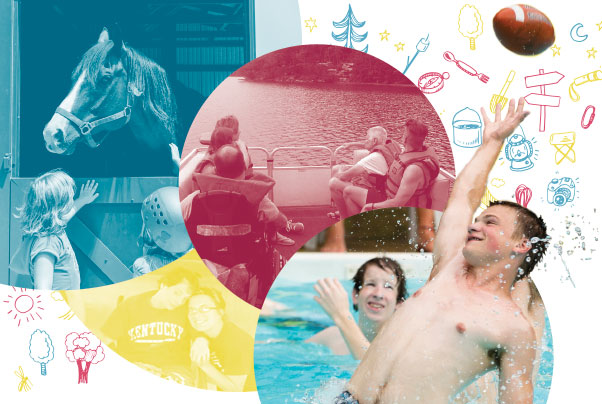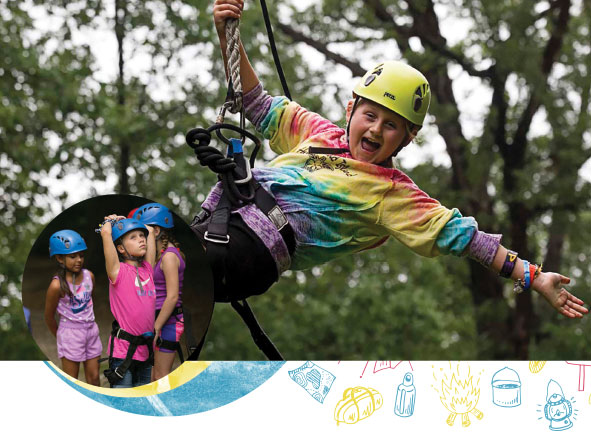Every summer thousands of youngsters enjoy the experiences of summer camps. They make new friends, enjoy new experiences ranging from hiking and swimming to zip line trips, and take in all the great outdoors offers. Scout organizations, church camps and even athletic groups give campers summer adventures they will never forget.
 While most camps cater to kids enjoying their summers away from school, a special group of camps organize and hold camping programs for young people (and some adults) who, because of medical conditions or disabilities, cannot participate in traditional camp programs. These are very special camps for very special populations. In each case, camp organizers make appropriate accommodations to serve campers – wheelchair-accessible activities, increased staffing levels and specially-prepared meals are a few examples – but most of all, they try to make the camping experience one that attendees never forget.
While most camps cater to kids enjoying their summers away from school, a special group of camps organize and hold camping programs for young people (and some adults) who, because of medical conditions or disabilities, cannot participate in traditional camp programs. These are very special camps for very special populations. In each case, camp organizers make appropriate accommodations to serve campers – wheelchair-accessible activities, increased staffing levels and specially-prepared meals are a few examples – but most of all, they try to make the camping experience one that attendees never forget.
“The number one thing we hear from parents who come to pick up their kids after camp is ‘I never thought my child could experience anything like this.’ For these parents who have wished for normalcy for their children, it is incredibly powerful,” explains Deb Townsend, executive director of Timber Pointe Outdoor Center, a camp located on Lake Bloomington near Hudson. Timber Pointe, which is owned and operated by Peoria-based Easterseals Central Illinois hosts a variety of camps for special populations throughout the summer. Camps range from events specially designed for children with Asperger’s Syndrome and Attention Deficit-Hyperactivity Disorder to those with physical disabilities, or partner-led camps organized by the Muscular Dystrophy Association or other organizations. Some camps are what Townsend calls “integrated camps” where children without challenges – those “typically developing” – participate with those with special needs.
“Integrated programming makes it possible for all of these children to come and share their week of camp with children with disabilities or who are developing differently,” she says. “The children get to run alongside children they normally wouldn’t be with, and they learn compassion. They actually are able to give back to society in a way. They learn about children who have challenges every day.”
For those with challenges, the week or two at camp can be an unforgettable experience.
 “Our first-time campers are nervous, of course, because they don’t know what to expect,” says J.D. Tanner, director of Southern Illinois University’s Touch of Nature Environmental Center. “A common end of camp, however, is tears because they don’t want to leave.”
“Our first-time campers are nervous, of course, because they don’t know what to expect,” says J.D. Tanner, director of Southern Illinois University’s Touch of Nature Environmental Center. “A common end of camp, however, is tears because they don’t want to leave.”
Touch of Nature has been home to Camp Little Giant, a camp for children and adults with disabilities, for nearly 65 years. By many accounts, Camp Little Giant was one of the Midwest’s first camps for special populations.
“Back when it first started, the ‘normal’ kids got to go to camp and these populations didn’t get that experience. It really was seen as a crazy idea to get these kids outdoors and get them the same camping experience as everyone else,” Tanner adds.
Now, the camp serves nearly 250 children and adults every summer.
“Most of our campers arrive on Sunday and they first go through a brief medical screening, with staff and a nurse, to get a handle on needs and medications before they are checked into a cabin,” Tanner explains. “The rest of the days are a mix of being on the beach, swimming and boating, arts and crafts, camp fires and more; it’s everything that happens at regular camp.”
Tanner says that camp activities also include zip line rides, hiking on special trails and even horseback riding utilizing the trails at nearby Giant City State Park.
“We hear from parents and caretakers that campers can’t stop talking about camp, and we often hear that they won’t take off their camp T-shirt for several weeks. I think it is because camp is one of the few times that these people are given the opportunity to do ‘what everybody else does.’ Plus, they are able to do it with others who are in a similar situation so they feel at home and normal at camp.”
Vicki Lang, a therapeutic recreation specialist with Camp Little Giant, says camp is the first time that many participants get to do things that they have seen others do for years.
“We have a can-do attitude so that campers can do activities that normally they are told they can’t do,” she says. “They want to go horseback riding for example and we tell them that we can make it happen.”
Timber Pointe offers an adventure day camp where parents and caretakers drop off campers each morning and pick them up again late in the afternoon.
“Parents can opt for day camp so that instead of being in a day care center or in front of the TV, these children are outside, living and growing in an outdoor experience,” Townsend says.
All of the camps feature trained counselors and medical staff specially attuned to special-needs populations. Participants come from near and far for the programs. Of course, day camps attract campers from the immediate area. Some of the weeklong camps include participants from across the nation. Tanner says one of the campers at one of Camp Little Giant’s sessions last year was from Montana.
“It’s definitely a lifetime experience and one that many of our campers look forward to every year,” Lang says. “It’s a chance for campers to make friends who are no different than them. We just provide an opportunity for people with challenges who are normally turned away. It’s a chance for them to have the time of their life.”
Not only do the camps give attendees a chance to have some outdoor fun, the events also serve as a much-needed break from their normal routine.
“Our camp started as a way to give kids time away from all of the medical appointments and give them a week of normal childhood life. With all of the medical professionals on staff, parents don’t have to worry about their children,” says Rebecca Budde, development officer with the SIU School of Medicine in Springfield. The medical school started Camp Coco (Children’s Oncology Camp Organization) in 1986 as a way of giving children with cancers and related blood disorders an opportunity to enjoy camp. Camp Coco takes place every July at Timber Pointe. For many of the students, it is their first time away from home, but it is one they obviously enjoy.
“Yesterday was my first time I have ever been to camp in my life and it was awesome!” a camper named Leah wrote for the Camp Coco newsletter in 2012. Another camper, identified as M.S., shared daily experiences in the newsletter: “It’s only the second day of camp and I’ve already had a great time. The activities were fun-filled and exciting. For example, we got to pet llamas and shoot B-B guns, which was exciting and exhilarating.”
The camps also give a much-needed break to caregivers and parents.
“Not only do the campers have a great time in an environment which is safe, but it also gives parents or caregivers one or two weeks to have time for themselves and take care of their own needs,” Tanner says. “It gives them a breather.”
Many of the programs focus on the quintessential camp experience, but some have a very specific focus, such as Timber Pointe’s Penguin Project Camp. This camp focuses on young artists with disabilities and features a musical revue at the camp’s conclusion. The program is a replication of a similar effort, first started in Peoria, that pairs students without disabilities with those with Down’s Syndrome, visual and hearing impairments, cerebral palsy and other neurological disorders. Together, they learn, rehearse and present a play. It’s a way to instill self-confidence, build interpersonal skills and strengthen language skills.
Other opportunities are not organized camps at all. Camp Big Sky outside of Farmington offers a free opportunity for anyone with any disability to enjoy a day in the great outdoors.
“Our mission is to give people with their friends, caregivers and family, the opportunity to enjoy camping, boating, fishing, archery and other activities,” says Karla Kane, camp director. “Everything is accessible and open to them. They come out and we have volunteers that work with them to do whatever they want. We’re here to give them the experience.”
She says, with a day’s notice, camp administrators make all the necessary preparations (including finding volunteer hosts) for guests to enjoy outdoor recreation all at no cost.
Kane continues, “There are so many things and opportunities that people with disabilities don’t get to enjoy, especially outdoor activities. This is something that families can do together.”
The cost for each camper at overnight camps range from a few hundred dollars to as much as $1,200 per week for each camper, depending on the camp and the campers’ individual needs. But, all of the camp leaders say costs are kept down thanks to donations from civic groups, fundraising efforts and private donations. Tanner says it is not unusual for individuals to sponsor “camperships” to offset the costs. Some camps, like Camp Coco, are free to participants.
Regardless of the cost, campers and their families find the experience invaluable.
“The benefits are crazy,” Townsend says. “We are able to serve some of the neatest people in the world at one of the most magical places. The live-in community builds friendships and memories that last a lifetime.”
Camp Big Sky’s Kane says she gets a very personal sense of satisfaction from serving special needs campers.
“The really cool thing for me is that people come out and if they’ve never gone fishing before or never flown a kite or taken a boat ride, that when we give them that opportunity, it’s a wonderful feeling,” she says. “For me, it’s very rewarding to give people that opportunity. There’s no better word and no better feeling.”
Contact a local camp through the information below:
Camp Little Giant
SIU Touch of Nature
1206 Touch of Nature Road
Makanda, IL 62958
(618) 453-1121
www.ton.siu.edu
Camp Coco
SIU School of Medicine
P O Box 19620
Springfield, IL 62794
(217) 545-2955
www.siumed.edu/foundation/camp-coco
Easterseals Central Illinois Timber Pointe Outdoor Centre
20 Timber Pointe Drive
Hudson, IL 61748
(309) 365-8021
www.easterseals.com/ci/our-programs/camping-recreation/
Camp Big Sky
16478 East Markley Road
Fairview, IL 61432
(309) 258-6002
www.campbigsky.org
Camp New Hope
1364 County Road 100 East
Neoga, IL 62447
(217) 895-2341
http://campnewhopeillinois.org/
Photos courtesy of Camp Coco/SIU School of Medicine and Southern Illinois University Touch of Nature.









